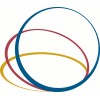
the Clinical Performance of the Oxysoft Daily Disposable Silicone Hydrogel Soft Contact Lens
MyopiaThe objective of this study is to demonstrate that the OxySoft silicone hydrogel soft contact lens could be prescribed as a supportive care for myopes.

Measuring the Peripheral Optical Quality of The Eye
NearsightednessThe goal of the study is to quantify wavefront aberration profiles of the eye with and without contact lens across the visual field. This will enable us to investigate the impact of the aberration on retinal image quality.

Evaluation of Near Visual Acuity With ODYSIGHT, a Smartphone Based Medical App in Comparison to...
Near VisionThis study evaluates the level of agreement between visual parameters tested using OdySight, a mobile application, and standards in office methods.
Retrospective Clinical Investigation of the Safety and Performance of 640PM Trifocal IOL Implantation...
CataractPresbyopia3 moreThe clinical investigation objective is to evaluate safety and performance outcomes of trifocal IOL implantation to improve vision in patients with cataract and/or ametropia (hyperopia, myopia) and/or presbyopia. Retrospective data from preoperative status up to 12 month postoperative status will be collected from patients that were implanted with Medicontur's 640PM intraocular lens: Preoperative status: Preoperative Screening and Baseline Surgery: IOL implantation M1: 1 month +/- 2 weeks postoperative follow-up M3: 3 months +/- 1 month postoperative follow-up M12: 12 months +/- 3 months postoperative follow-up

Assessment of Accommodation Behavior in Children Under Myopia Control Treatment (Pilot Study)
AccomodationBiofeedback Training1 moreThis study will examine the accommodative behavior in children undergoing myopia control treatments. A subset of children showing reduced accommodation, known to occur in while wearing multifocal soft contact lenses (MFCL) from previous studies, will undergo auditory biofeedback training to improve the accommodative response and possibly improve treatment efficacy. The results of this study will be used to design a larger clinical trial. Aim 1 - The accommodation response in myopic children being treated with MFCL for six months or longer, will be determined. The accommodative response data will be collected while the patients are wearing the MFCL and will be compared to the baseline control response when the subjects wear single vision soft contact lenses (SVCL). Additional comparisons will include accommodative measures in untreated myopic children wearing spectacle corrections (unttreated controls), children being treated with ortho-keratology contact lenses, and children treated with low-dose atropine (0.01%, considered not to affect accommodation). How these additional myopia treatments affect the accommodation response has yet to be determined. Aim 2 - Children treated with MFCL who show reduced accommodative responses will undergo a brief period of auditory biofeedback accommodative training to determine whether the response in children can be improved and how long it can be sustained. Improving the accommodative response in these patients may improve the treatment efficacy by increasing the effect of the positive power addition built into the lenses.

Study on the Measurement of Retinal Blood Flow in Children
MyopiaIn order to provide reference for clinical application, the normal values of retinal blood flow parameters in Chinese healthy children were measured by oct-angiography. Meanwhile, the repeatability and consistency of retinal blood flow parameters measured by oct-angiography in children were further analyzed, and the correlation of retinal blood flow parameters with eye axis, choroidal thickness, age and diopter was analyzed, so as to provide basis for clinical diagnosis of children's ophthalmopathy. Objective to study the effect of short-term optical defocusing on retinal blood flow parameters, and analyze the correlation between the changes of posterior segment parameters before and after short-term optical defocusing, so as to provide the basis for the possible compensation mechanism of posterior segment optical defocusing, and further understand the possible physiological mechanism of myopia.

Evaluating the Effect of Optical Zones on Correction for SMILE: Vector Analysis
MyopiaEvaluate the effect of the size of optical zones (OZ) on myopia and astigmatism correction in small incision lenticular extraction.

A Study to Learn More About How Drug Aflibercept Works in Canadian Patients With Reduced Vision...
Myopic Choroidal NeovascularizationBeing short sighted means that vision is blurry when looking at things far away. People with a condition called "pathologic myopia" are short sighted due to problems in the back layer of their eyes, also known as the retina. Some people with pathologic myopia can develop a serious condition called myopic choroidal neovascularization (mCNV). In people with mCNV, new blood vessels grow into the retina. These blood vessels can break, leaking blood or fluid into the retina. This can cause blurry vision or a loss of vision. In this study, researchers will find out more about how well drug aflibercept works and how safe it is in Canadian patients with mCNV. The researchers in this study will review information from the patients' eye doctor visits. The patients in this study will include Canadian men and women who started receiving aflibercept between May 2017 and August 2019. These patients were at least 18 years old and had not received treatment for their mCNV before. The researchers will look at the results of vision tests to find out how well the patients could read from a distance after they received aflibercept for 6 months. They will compare the results of these tests to before the patients received treatment. They will also learn more about how safe it is to have aflibercept injection into the eye.

Clinical Evaluation of Two Monthly Replacement Silicone Hydrogel Contact Lenses
MyopiaAstigmatismThe purpose of this study is to evaluate differences in the comfort at the end of the month between Air Optix® lenses versus Biofinity® lenses in habitual daily wear symptomatic soft contact lens wearers.

A Comparison of Two Color Contact Lenses in Habitual Clear Contact Lens Wearers
MyopiaRefractive ErrorThe purpose of this study was to evaluate overall satisfaction with AIR OPTIX® COLORS as compared to FRESHLOOK® COLORBLENDS contact lenses.
